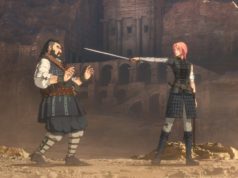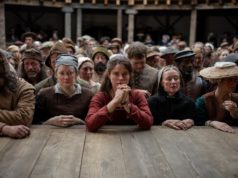When Noni (Gugu Mbatha-Raw) first sings, she’s a little girl in a talent competition performing Nina Simone’s “Blackbird.” She comes in second place, and her passionate stage mom Macy Jean (Minnie Driver) tells her to toss the trophy, which Noni does. A quick cut later, and Noni is an adult, clad in a revealing leather outfit and splaying herself before the camera for a music video. The filmic transition says a lot about Beyond the Lights: its focus on character, the points it makes, the skill with which it makes them, and how it avoids becoming a forced melodrama. The only thing that cut doesn’t say is how heartfelt and entertaining the movie is.
The shift is made with no dramatic music cues or showy dissolve, just a simple juxtaposition, a sudden turn from innocence to exploitation. Instead of being overloaded with a song about how Noni’s no longer a little girl or something equally unsubtle, writer/director Gina Prince-Bythewood lets us put it together ourselves.
That same deft approach shows up when Kaz (Nate Parker) enters the picture. A cop working security for Noni, he’s there and able to stop her when she tries to jump off a balcony. Kaz almost feels like a superhero saving the day, not through superpowers, of course, but just by being the most decent person in the room. Recognizing, if not needing, someone who doesn’t view her as property, Noni asks Kaz to continue working security for her. Perhaps expectedly, they soon start falling for each other.
But the movie makes most expectations feel natural. Kaz and Noni aren’t clichéd stereotypes but characters with distinct personalities and motivations. When Noni and her mother fight over her music, it’s because of their different personalities rather than the plot’s need for a dramatic moment. The “will they or won’t they?” between Noni and Kaz comes not from the movie teasing us but because these two people have very different lives and goals. Through strong acting, well-written dialogue, crafty cinematography, naturalistic lighting, and even transformative makeup, Beyond the Lights makes elements like slimy musicians, love against the odds, and even a karaoke song all seem like parts of a naturally flowing story rather than a bag of clichés. (That song in particular is the movie’s –– and Mbatha-Raw’s –– best scene.)
That’s just the story working despite itself. It really soars because of the central performances. Parker gives Kaz a natural sense of underplayed goodness (though not Boy Scout perfection) and brings enough humor, personality, and failings to make him human. But this film undoubtedly belongs to Mbatha-Raw. It’s easy to see every pop star in her, even easier to see the female ones whose sex appeal matters more to the public than their singing abilities. Part of the joy of Beyond the Lights is watching Noni’s almost epic personal struggle, starting out a gorgeous blank slate spouting cheap lyrics and coached lines and transforming into someone who finally realizes why she loves music and that she wants to love whom she chooses. It’s like seeing a blank canvas become a detailed painting.
This isn’t to say the movie vaults every hurdle. For every three examples of avoided clichés, be it a psychologically layered stage mom or a strained father-son relationship being handled realistically, there’s a scene with a pushy producer explaining, “With Noni, we’re selling a fantasy!” The film also trips over pacing –– though under two hours, it sometimes feels like three, dragged down by scenes that wallow in emotion, like a getaway to Mexico, a subplot about a potential dip into city politics, and Noni’s relationship with a fellow musician. All of these scenes could have been easily deleted.
The little problems don’t keep Beyond the Lights from achieving something rare. It’s not high-concept or awards material, but the story and performances add up to a damned good time at the movies.
[box_info]
Beyond the Lights
Starring Gugu Mbatha-Raw, Nate Parker, Minnie Driver, and Danny Glover. Written and directed by Gina Prince-Bythewood. Rated PG-13.
[/box_info]












